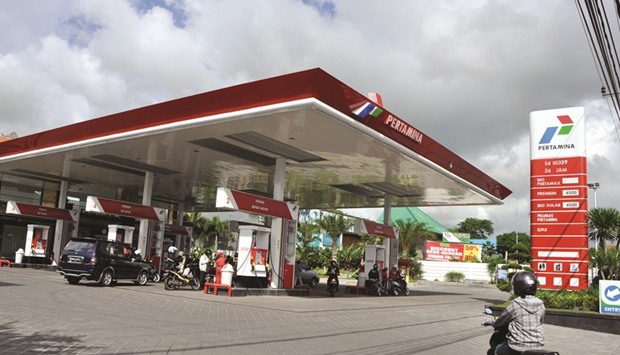Indonesian President Joko Widodo is pushing ahead a plan to reduce air pollution, and his nation’s state fuel maker is struggling to keep up.
While the country plans to adopt stricter emissions standards for new vehicles in October 2018, the refiner that supplies 90% of the retail fuel market is unlikely to finish upgrading its plants so they can process the cleaner fuel by that time. That means Indonesia will need to boost imports of so-called Euro IV-compliant gasoline next year, according to industry consultant Energy Aspects Ltd and BMI Research.
Meeting domestic demand for the cleaner gasoline through its own production by 2018 will be difficult for Indonesia, said Peter Lee, oil and gas analyst at BMI Research in Singapore. “This means that a significant portion of its annual gasoline consumption will need to be met through imports.”
Asia’s third-most populous country is the latest among regional nations including China and India to combat air pollution. Their efforts are sending ripples across the region’s energy landscape, with drivers resistant to change striking in the Philippines to South Korean refiners fearing competition will heat up. The financial impact on PT Pertamina, Indonesia’s state oil processor, is still unclear and may rest on its negotiations with the government, which sets domestic fuel prices.
Widodo, who is also known as Jokowi, made a pledge two years ago to reduce Indonesia’s emissions by 29% in 2030. Its capital Jakarta suffers from dangerously poor air quality, and a move to cleaner fuels is needed to help reduce pollution related illnesses, according to a 2014 report by the International Council on Clean Transportation. Moving to Euro-IV standards would put the city on par with Bangkok and New Delhi, though below levels in Beijing, which has been aggressive in reducing sulfur levels, the report said.
Indonesia imported 285,000 barrels per day of Euro-II gasoline in 2016, said Nevyn Nah, an oil products analyst at Energy Aspects in Singapore. Overseas purchases will rise to 320,000 barrels per day of Euro-IV gasoline in 2018, he said.
Pertamina is still in the middle of upgrading units and won’t be able to supply the high-quality fuel for at least another four years, said BMI Research’s Lee. He estimates that the country’s annual gasoline consumption will average about 670,000 barrels a day over the next five years. Oil products imports had fallen to 23.9mn metric tonnes in 2016 from 29.6mn tonnes in 2013, according to government data.
Pertamina aims to complete an upgrade of its Balikpapan refinery in 2019 and its Cilacap refinery in Central Java in 2021, after which both refineries will be able to produce fuels up to the Euro-V standard. Progress on the revamp has been limited due to strained finances amid lower oil prices, BMI Research said in a March 1 note. Until the upgrades are finished, Pertamina will import cleaner gasoline, said Gigih Wahyu Irianto, the company’s senior vice president for fuel marketing and distribution.
The impact on Pertamina’s balance sheet remains unclear as the refinery and gas station operator is owned by the government, which regulates domestic fuel prices. If half of Indonesia’s drivers buy new Euro-IV compliant vehicles next year, it will have to import 200,000 barrels a day of the gasoline, BMI Research’s Lee said.
“We’re still studying the regulation,” said Daniel Purba, senior vice president at Pertamina’s Integrated Supply Chain unit, which handles the company’s crude and fuel imports.
Still, some are optimistic Indonesia’s refineries can beat their own schedules. Pertamina may speed up its refinery upgrades to limit fuel imports, said Josua Pardede, an economist at PT Bank Permata. “If Pertamina can’t speed up the refinery upgrade, the government will need to import such fuel possibly until 2021 or even later through 2025,” Pardede said. “That won’t look good on the country’s trade balance.”

Pertamina, Indonesia’s state oil processor, aims to complete an upgrade of its Balikpapan refinery in 2019 and its Cilacap refinery in Central Java in 2021, after which both refineries will be able to produce fuels up to the Euro-V standard. Progress on the revamp has been limited due to strained finances amid lower oil prices, BMI Research said in a March 1 note.
